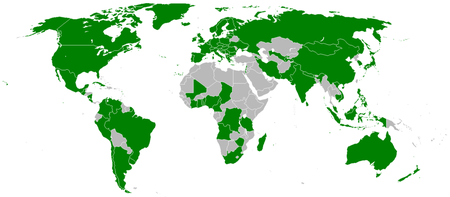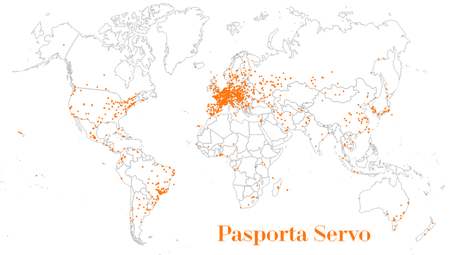
Should you Learn Esperanto?
First published: Thursday April 14th, 2022
Report this blog
Introduction
Esperanto is a language that seems to divide opinions among those that are interested in conlangs (constructed languages), and a lot of misconceptions exist about it, in my opinion. I will go over a brief history of it and what I believe are some positives and negatives of the language, while also analysing other aspects about it.
A Short History of Esperanto
Esperanto was created by L.L Zamenhof in 1887, and was intended to be an International Auxiliary Language (a common language shared between different linguistic groups, intended to be as easy as possible for each group to learn.) The language had a modest but growing population of speakers at that time, helped by various books published by Zamenhof. In 1908, there were proposals for Neutral Moresnet, a territory between the Netherlands, Belgium and Germany, to adopt Esperanto as its official language, and there was a fairly large number of speakers there at that time. This was arguably the closest Esperanto got to being an official language of a state.
There was a proposal for the League of Nations to adopt it for use in international relations, and it was denied due to France voting against, despite 10 other nations voting for it. France then banned Esperanto in schools, due to the French government viewing Esperanto as a threat to it's status as a lingua franca (common language in the world.) This was when Esperanto was most popular, but this didn't last for very long. The 30s brought the rise of dictatorship to Europe, and Nazi Germany, the USSR and Spain all tried to repress the language. Internationalism, and therefore Esperanto, very clearly declined in this period, and never really recovered.
Today, Esperanto still has between 30,000–180,000 second language speakers, being similar in size to Romansh and Scots Gaelic. It is now a language on Google Translate, and has a Duolingo course.

Positives of Esperanto

• It's remarkably easy to learn
Esperanto has only 16 rules of grammar (although there are more things that come into play, and the rules are more complicated than they may sound), among other things that make it much more simple than a natural language. It is estimated to take English speakers just 150 hours to learn Esperanto to near fluency, compared to 600 for a Romance language like French or Spanish. These figures are just estimates however, because I couldn't find a precise source as they all linked to irrelevant material.
• It helps in acquiring other languages (sort of)
A study taken from 2006 to 2011 found that with primary school children in the UK, learning Esperanto resulted in children having a greater understanding of how language worked, and this later helped them when they were learning French. However, the question arises that if these children were just taught how language works without learning Esperanto, would they perform any better?

•The Community
Esperanto has quite a different community to those of natural languages, mainly because everyone has to learn it as a second language, and there is no Esperanto diasprosa members. Despite my issues with it (which I won't go over in this blog), there are programs such as Pasporta Servo, which allows Esperanto speakers to lodge at the houses of those that are part of this program.
Negatives of Esperanto
•The Orthography (How it is Written)
Esperanto's sound inventory is alright in my opinion, and while some of its sounds are slightly unusual, it does a decent job at replicating the common sounds in the inventories of (European) languages. However, a problem arises in the orthography. It uses the characters ĉ, ĝ, ĥ, ĵ, ŝ, and ǔ, which aren't standard in the Latin alphabet, and are a pain to type. Obviously Zamenhof wasn't thinking about that when he created the language, but it definitely hinders its viability as an International Auxiliary Language in the present.
There are some substitutions for these characters, such as having the letter of each character, and then an 'x' (e.g. sx instead of ŝ.) This is fine, in my opinion, but the problem lies in the fact that 'sh' would be used by some Esperanto speakers in that situation (and endorsed by Zamenhof himself), and there is no standardisation in this matter.
I know I have gone on about diacritics for some time, but I just want to say that 'ĥ' is definitively the worst of them. It represents an /x/ sound in IPA, like the 'ch' in loch, and you would have thought that representing it with an x would have made sense instead. However, 'ĥ' is used instead, a character with its diacritic barely readable from a distance, and in my opinion, it looks quite ugly (I know aesthetics aren't the point of an IAL, but still.) Even worse is the sheer lack of languages that this character appears in, with the only other language being a pidgin (a grammatically simplified language created between groups without a common language) called Chinook Jargon. This language has only 650 speakers, this character only appears in one orthography system for it, and the character was added after the creation of Esperanto, meaning that Esperanto created this monstrosity.

•The Euro-centrism of its Lexicon (Words that it Uses)
Esperanto is an IAL, but its lexicon isn't very international. The vast majority of its vocabulary is derived from the Germanic or Romance language family, and this definitely hinders its effectiveness, as these families cover only 25% of the worlds population. Its grammar and orthography are based on Slavic languages confusingly, but this still doesn't help. Despite the little I have to say on this matter, I would definitely argue that this is the most important of the criticisms.
•The Sexism in its Lexicon
I know that sounds like quite an outlandish claim, but Esperanto was created in the 19th century, and therefore is somewhat of a product of its time. Some nouns (mostly relating to people) are by default masculine, so 'doktoro' can either mean 'male doctor' or 'doctor of an unspecified gender', while the affix '-in' is used to denote a woman (doktorino.) However, many Esperanto speakers use the affix '-iĉ', but it is yet again not a universal feature.

What About Ido?

Ido is a derivative of Esperanto, and also aims to be an IAL. It uses a slightly wider selection of languages for its vocabulary, taking words from Spanish, Russian, French, Italian, German and English. For an IAL, this still isn't really good enough, but it's an improvement. Ido also gets rid of the diacritics in Esperanto, using only the 26 characters of the English alphabet. However, some letters now represent more than one sound, which is something to consider. In general though, I prefer Ido's orthography a lot more than Esperanto's. Another thing that Ido improves over Esperanto in is it's gendering of nouns, as the base noun is never gendered. The affix '-ul' is used for masculine nouns instead, much like Esperanto's '-iĉ' but standardised.
Nevertheless, Ido still has flaws. The prefix 'mal-' is used in Esperanto to indicate the opposite of something, so if you wanted to write 'bad' in it, you would use 'mal-' and then the word for 'good', which is 'bona', giving you 'malbona'. This prefix is used a lot, and many Idists claim it is overused, so either 'des-' or a separate word is used. This can be argued as a positive, but it also makes the language slightly harder to learn. Of course there are other flaws, but I would like to highlight Ido's speaker count, which stands at around 1,000. This is a major barrier for anyone learning the language, not only in finding resources for it, but actually finding people to speak it to.
The Final Question - Should you Learn Esperanto?
Everyone will have different reasons for why they want to learn a language, and the answer to this question really depends on what you want to achieve with the process. Esperanto isn't a very useful language if you want to travel the world, and hasn't succeeded at being an IAL. But if you like the look of the community, and don't mind the flaws of the language, then go ahead. Anyway, thanks for reading this far, and goodbye.

It sounds like an interesting premise to have a conlang as a universal language, I imagine it could solve a lot of problems that we face with English becoming the universal language for now (at least in the west).
Thanks for this insight!
Great blog, Niobium :)
Never expected an Esperanto community in Brazil, and seeing many cities on here (including Belo Horizonte) having a Pasporta Servo was really nice!
This was an amazing blog! Hope more will come for other languages like Latin, or even the popular ones like... Portuguese? Lol.
I agree. If you wanna learn Latin, you can, but almost no one uses it nowadays. Maybe the part of positives and negatives points, as well as the history of the language would be good! I remember TheNatureThread trying to do this with the Top 20 most spoken languages of the world. You could do a collab. Would be interesting to see two brilliant minds working together :)
see what i did therefor other parts of the world. I might make a video about India's language issues, and I might talk about what an Indian Esperanto could be like.I have been trying (and failing) to learn Spanish and french and some other languages, but Esperanto is the easiest for me so far